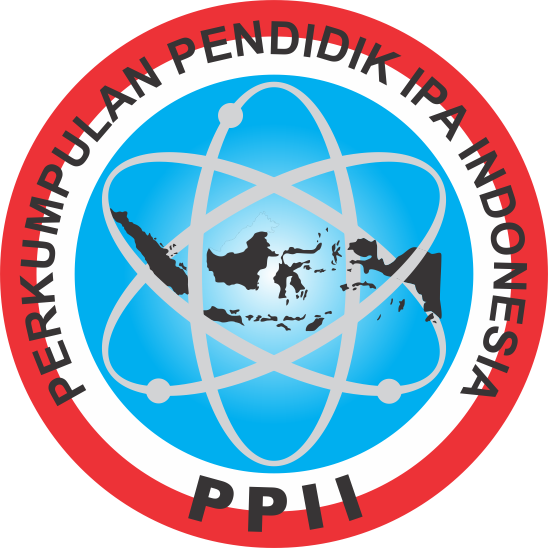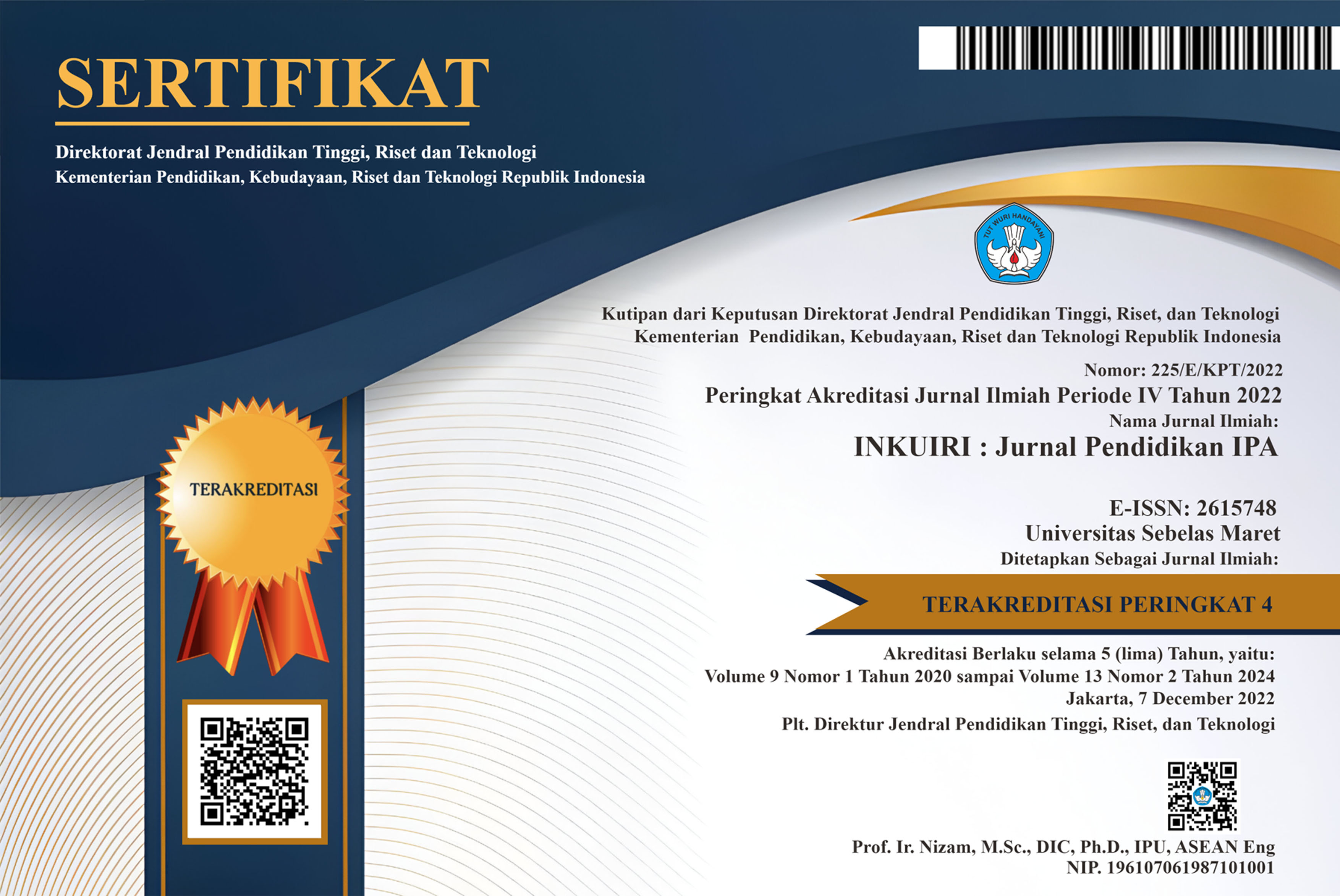Implementation of Science Learning in Inquiry-Based Field Work Lectures in an Effort to Encourage IKU Achievement in Higher Education
Abstract
Implementasi Pembelajaran Kuliah Kerja Lapangan (KKL) berbasis inquiry telah dilakukan program studi S3 Ilmu Lingkungan UNS. KKL berfungsi mengaplikasikan teori di dalam kelas dengan di lapangan sehingga akan berpengaruh pada hasil belajar dan keefektifan pembelajaran. Melalui KKL berbasis inquiry, mahasiswa memperoleh pengalaman langsung dalam menjelajahi dunia kerja dan masyarakat, dengan penekanan pada pengembangan keterampilan analitis, kemampuan pemecahan masalah, serta pengambilan keputusan yang didasarkan pada data. Pendekatan inquiry memberi peluang bagi mahasiswa untuk aktif terlibat dalam proses pembelajaran, dengan cara mengajukan pertanyaan, melakukan penelitian, dan mencari solusi atas tantangan yang dihadapi di lapangan. Penelitian ini membahas tentang implementasi Kuliah Kerja Lapangan berbasis inquiry pada mahasiswa S3 Ilmu Lingkungan. Metode yang digunakan adalah metode kualitatif. Subjek dari penelitian ini adalah mahasiswa yang melakukan kuliah kerja lapangan di TN Baluran. Analisis data dimulai dengan wawancara kepada subjek penelitian tentang implementasi Kuliah Kerja lapangan, sedangkan untuk data hasil belajar digunakan tabulasi. Berdasarkan hasil wawancara, implementasi pembelajaran KKL S3 Ilmu Lingkungan atas tiga tahapan, yakni tahapan persiapan, pelaksanaan, dan sesudah KKL. Tujuan KKL ini adalah meningkatkan kemampuan pemahaman konsep teoritis, mengaplikasikan pengetahuan mahasiswa terhadap situasi dan kondisi TN Baluran serta menemukan problem solving atas permasalahan lingkungan di TN Baluran. Pembelajaran KKL berbasis inquiry ini berperan penting dalam pencapaian IKU, terutama dalam aspek peningkatan kualitas pembelajaran, pengembangan kompetensi mahasiswa, serta mempererat hubungan perguruan tinggi dengan dunia industri
Implementation of inquiry-based Field Work Lecture (KKL) learning has been carried out by the UNS Environmental Science Doctoral study program. KKL functions to apply theory in the classroom and in the field so that it will influence learning outcomes and learning effectiveness. Through inquiry-based KKL, students gain direct experience in exploring the world of work and society, with an emphasis on developing analytical skills, problem solving abilities, and decision making based on data. The inquiry approach provides opportunities for students to be actively involved in the learning process, by asking questions, conducting research, and finding solutions to challenges faced in the field. This research discusses the implementation of inquiry-based Field Work Lectures for PhD students in Environmental Science. The method used is a qualitative method. The subjects of this research were students who did fieldwork at Baluran National Park. Data analysis began with interviews with research subjects regarding the implementation of fieldwork lectures, while for learning outcome data tabulation was used. Based on the results of the interview, the implementation of KKL learning for Doctoral Environmental Sciences consists of three stages, namely the preparation, implementation and post-KKL stages. The aim of this KKL is to improve the ability to understand theoretical concepts, apply student knowledge to the situation and conditions of Baluran National Park and find problem solving for environmental problems in Baluran National Park. This inquiry-based KKL learning plays an important role in achieving IKU, especially in the aspects of improving the quality of learning, developing student competencies, as well as strengthening relations between universities and the industrial world.
Keywords
Full Text:
PDFReferences
Banchi, H., & Bell, R. (2008). The many levels of inquiry. Science & Children, 46(2).
Czochański, J., Korwel-Lejkowska, B., Staszek, W., & Zawadzka, A. K. (2024). The role of student fieldwork activities in the education of Spatial Management on the example of classes at the University of Gdańsk. Journal of Geography, Politics and Society, 14(1), 56–65. https://doi.org/10.26881/jpgs.2024.4.06
Gunn, K. E., Mccauslin, C. S., Staiger, J., & Pirone, D. M. (n.d.). Inquiry-based learning: inflammation as a model to teach molecular techniques for assessing gene expression. Journal of Microbiology & Biology Education, 14(2), 189–196. https://doi.org/10.1128/jmbe.v14i2.542
Hamm, M., & Adams, D. (2002). Collaborative Inquiry: Working toward Shared Goals. Kappa Delta Pi Record, 38(3), 115–118. https://doi.org/10.1080/00228958.2002.10516356
Kassim, N. F. N., Hamzah, N., & Mohd Khairlani, N. H. (2024). Impact of Fieldwork Courses on the Students’ Learning Experience and Academic Performance. 35(1), 75–84. https://doi.org/10.37934/frle.35.1.7584
Kelp, C. (2014). Two for the Knowledge Goal of Inquiry. American Philosophical Quarterly, 51(3), 227–232. http://eprints.gla.ac.uk/140958/
Lee, J. (2020). Designing an Inquiry-based Fieldwork Project for Students Using Mobile Technology and Its Effects on Students’ Experience. Review of International Geographical Education Online, 10(1 (Special Issue), 14-39. https://doi.org/10.33403/rigeo.637666
Madsen, L.M., Evans, R., Malm, R.H. (2021). Using a Wicked Problem for Inquiry-Based Fieldwork in High School Geology: Addressing Climate Change and Mass Extinction Events. In: Achiam, M., Dillon, J., Glackin, M. (eds) Addressing Wicked Problems through Science Education. Contributions from Science Education Research, vol 8. Springer, Cham. https://doi.org/10.1007/978-3-030-74266-9_901
Munge, B., Thomas, G. J., & Heck, D. (2018). Outdoor Fieldwork in Higher Education: Learning From Multidisciplinary Experience. Journal of Experiential Education, 41(1), 39–53. https://doi.org/10.1177/1053825917742165
Sim, H.H., Liow, S.S.G. (2021). Inquiry-Based Fieldwork for Children’s Localities and Beyond in Primary Social Studies: Student Teachers’ Understandings, Concerns and Suggestions. In: Sim, T.Y., Sim, H.H. (eds) Fieldwork in Humanities Education in Singapore. Studies in Singapore Education: Research, Innovation & Practice, vol 2. Springer, Singapore. https://doi.org/10.1007/978-981-15-8233-2_6
Sekolah Pascasarjana UNS (2023). Lembar Evaluasi Diri Program Studi S3 Ilmu Lingkungan
Sekolah Pascasarjana UNS (2023). Dokumen Kurikulum Program Studi S3 Ilmu Lingkungan
Thomas, G. J., & Munge, B. (2017). Innovative outdoor fieldwork pedagogies in the higher education sector: Optimising the use of technology. Journal of Outdoor and Environmental Education, 20(1), 7–13. https://doi.org/10.1007/BF03400998
Waluyo, M., & Bima, W. P. (2023). Pengembangan lkpd inquiry based learning untuk mendukung kemampuan penalaran dan pembuktian matematis. JMPM (Jurnal Matematika Dan Pendidikan Matematika). https://doi.org/10.26594/jmpm.v8i2.3536
Refbacks
- There are currently no refbacks.






